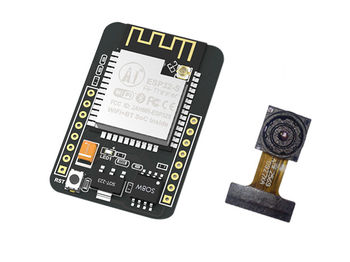Esp32cam: Difference between revisions
Jump to navigation
Jump to search
(added link to video with simple guide) |
|||
| (9 intermediate revisions by 2 users not shown) | |||
| Line 3: | Line 3: | ||
|Picture=ESP32-CAM.jpg | |Picture=ESP32-CAM.jpg | ||
|Omschrijving=Cheap webcams with Wifi, what could possibly go wrong? | |Omschrijving=Cheap webcams with Wifi, what could possibly go wrong? | ||
|Status= | |Status=In progress | ||
|Contact=noopwafel | |Contact=noopwafel | ||
|Contact1= | |Contact1=bertrik | ||
}} | }} | ||
== Introduction == | |||
It's an ESP32 board with a camera, running a web server, so it acts as an inexpensive webcam. | |||
== Hardware == | |||
* http://wiki.aithinker.com/esp32-cam | * http://wiki.aithinker.com/esp32-cam | ||
* [[bertrik]] ordered [https://aliexpress.com/item/ESP32-CAM/32947577882.html this board on AliExpress] | |||
To install the camera: | |||
* flip the black part of the camera connector 90 degrees so it points up | |||
* place the camera connector, contacts towards the PCB, camera facing up | |||
* gently slide the connector in place (about 2 or 3 mm of travel), e.g. pushing with the screw driver onto the rigid part of the camera connector towards the white part of the PCB connector | |||
* flip the black part of the connector back into the flat position. | |||
Pins (ESP32 cam to USB serial converter): | |||
* ESP-32 5V to USB serial 5V | |||
* ESP-32 GND to USB serial GND | |||
* ESP-32 UAR to USB-serial TX | |||
* ESP-32 UAT to USB-serial RX | |||
* ESP-32 IO0 looped to ESP-32 GND (they are next to each other), you can use a jumper or a dupont wire. CLOSED for flashing, OPEN for running. | |||
== Software == | |||
* maybe https://github.com/m5stack/m5stack-cam-psram ? | |||
* https://github.com/donny681/ESP32_CAMERA_QR | * https://github.com/donny681/ESP32_CAMERA_QR | ||
* [https://youtu.be/q7Z_XnBYFhY Step by step video guide to getting it up and running with Arduino IDE and the Expressif CameraWebServer example] | * [https://youtu.be/q7Z_XnBYFhY Step by step video guide to getting it up and running with Arduino IDE and the Expressif CameraWebServer example] | ||
* https://github.com/geeksville/TenDollarWebcam | |||
=== platformio === | |||
The CameraWebServer example can be compiled as a platformio project: https://github.com/bertrik/CameraWebServer | |||
To build the code, clone the git repo above, cd into it, then type | |||
pio run | |||
To upload it to the board (put a jumper between IO0 and GND): | |||
pio run -t upload | |||
To watch the debug output (remove the jumper): | |||
pio device monitor | |||
Platformio can be installed on a Debian Linux system as follows: | |||
sudo apt install python-pip | |||
sudo pip install platformio | |||
pio upgrade | |||
Latest revision as of 16:49, 31 July 2021
| Project ESP32-CAM | |
|---|---|

| |
| Cheap webcams with Wifi, what could possibly go wrong? | |
| Status | In progress |
| Contact | noopwafel, bertrik |
| Last Update | 2021-07-31 |
Introduction
It's an ESP32 board with a camera, running a web server, so it acts as an inexpensive webcam.
Hardware
To install the camera:
- flip the black part of the camera connector 90 degrees so it points up
- place the camera connector, contacts towards the PCB, camera facing up
- gently slide the connector in place (about 2 or 3 mm of travel), e.g. pushing with the screw driver onto the rigid part of the camera connector towards the white part of the PCB connector
- flip the black part of the connector back into the flat position.
Pins (ESP32 cam to USB serial converter):
- ESP-32 5V to USB serial 5V
- ESP-32 GND to USB serial GND
- ESP-32 UAR to USB-serial TX
- ESP-32 UAT to USB-serial RX
- ESP-32 IO0 looped to ESP-32 GND (they are next to each other), you can use a jumper or a dupont wire. CLOSED for flashing, OPEN for running.
Software
- maybe https://github.com/m5stack/m5stack-cam-psram ?
- https://github.com/donny681/ESP32_CAMERA_QR
- Step by step video guide to getting it up and running with Arduino IDE and the Expressif CameraWebServer example
- https://github.com/geeksville/TenDollarWebcam
platformio
The CameraWebServer example can be compiled as a platformio project: https://github.com/bertrik/CameraWebServer
To build the code, clone the git repo above, cd into it, then type
pio run
To upload it to the board (put a jumper between IO0 and GND):
pio run -t upload
To watch the debug output (remove the jumper):
pio device monitor
Platformio can be installed on a Debian Linux system as follows:
sudo apt install python-pip sudo pip install platformio pio upgrade